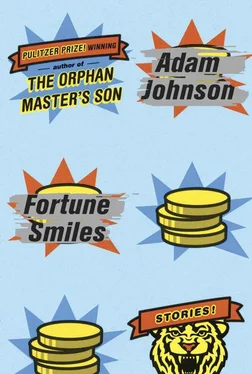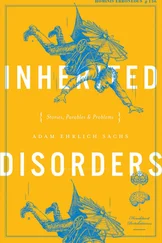“How may we help?” Grünwald asks. Even though his hair is white, he parts it dramatically, allowing him the opportunity, which he takes now, to correct the fall of his hair with a sweep of his long, sleek fingers.
The other woman adds, “We’re trying to get to the torture museum before it closes.”
Grünwald winces. “Torture museum?” He turns to me. “Have you heard of such a thing?”
I shake my head.
“Who would make such a museum?” Grünwald asks. “Who would want to visit one?”
The first woman stands her ground. “It’s in a prison,” she says. “This is a famous place.”
She lifts the map so we can see. Marked are Holocaust memorials, Nazi deportation camps, extermination sites, and right in the middle, our prison.
“Is this some kind of atrocity tourism?” Grünwald asks.
The second woman takes the map back.
“This is history,” she says. “This is how respect is paid.”
“If you don’t know the past,” her friend says, “you have to repeat it.”
“We know the place you’re looking for,” I say.
Grünwald interrupts. “Yes, yes, I remember now the prison you seek,” he says and points the wrong way. “To get there, you must take the M5 tram five stops. No, six. Six stops. Your historical prison is exactly six stops in that direction.”
The women offer suspicious glances, but they turn and walk away.
When they’re gone, Grünwald rakes his hair as if to rid himself of what just happened. “Come to the local tonight, Hans. Let your old friends buy you a beer. We’ll celebrate your new fame. And let me tell you, there are a few ladies who join us that prefer the company of a GDR man. I’ll introduce you. They like the type who lights the cigarettes and buys the drinks. They crave our authority, Hans. They desire a man who takes charge. What do you say? You can bring your pooch if you like. There is a blind man who brings his.”
I can imagine what it’s like to spend a night drinking with Grünwald in his Stasi speakeasy — endless talk of the GDR days, when the beer was stronger, the orgasms were longer and the coins were cast from pure silver. By midnight, they’d be practically singing in Russian. And the thought of talking to a woman other than my wife makes me ill.
“The video has you upset, I can tell,” Grünwald says. “Pay no mind to how the girl mocked you. You were an admirable and respected warden. People would know that if these lying inmates didn’t hog the media. Has one of them ever told an interviewer, ‘The prison was clean and well ventilated and my meals came right on time, three times a day’? Do they ever mention their access to a state-of-the-art prison hospital with a medical staff of twenty-eight? Remember the blizzard of ’84, when all of Berlin went black? Only you kept the lights on, Hans. Hohenschönhausen Prison alone had heat and power, and that was because of you.”
I see the Austrian women have stopped at the end of the block to reexamine their map. They cast doubtful looks our way.
“Grünwald,” I say, “you forgot to mention why you were following me.”
“Yes, yes. It’s because you were speaking with the curator of that place. I have to tell you, Hans, you must be careful with him. He bankrolls the former inmates. He books their television appearances. You must tell me what it was he wanted.”
“He wants me to make a video. He wants me to talk about the prison and tell our side of the story.”
“Why would he want that?”
“First there is a question I must ask you.”
“Of course, Hans. For you, anything.”
I want to ask about those hidden bugs in my office, about the secret files they must have compiled, the calls they recorded, how right now, in that little mind of his, he must know every secret thing about Gitte and me.
Instead, I ask, “Have you been receiving any packages? Things from our prison days, neatly wrapped and delivered at night?”
He’s intrigued. “Would you call these packages gifts ?”
“They are things I once possessed. Sentimental things.”
Prinz grows impatient and barks. From a bag in my pocket, I remove a goldfish, but Grünwald stops me. “It is affection that the little fellow craves,” he says, and lifts Prinz from the ground. “It is by giving and denying that you condition his response.” He scratches the dog’s small ears. “So you have a prison curator who desires something from you. And you have possessions from your prison days that suddenly appear.”
Grünwald smiles. It comes with a glimmer of menace and intrigue, his eyes narrowing, not without a hint of delight, as he imagines various scenarios unfolding before him. This is the look that earned him the Black Shield. It’s easy to forget, even for me, that thousands of inmates once lived in fear of him, that people hanged themselves rather than spend an afternoon in his presence.
—
The following morning the curator delivers the portrait. I rise from the couch when he knocks, and even I can smell the old upholstery on me. He wears a suit, and the frame he holds is cloaked in a black hood, as if the portrait is awaiting some kind of debut.
“I have it,” he says.
He lifts the dark fabric a moment, and there are Brigitte and Hans, man and wife.
“The archivists undertook an examination,” the curator says. “They believe this is the work of the photographer Sibylle Bergemann.”
“My wife once modeled for Sibylle, back when they both worked at Praktica Kamera Werke. Back when there was a Praktica Kamera Werke. Everyone was let go when the Wall came down. Three hundred people.”
He extends the portrait. “The archivists believe the photo is quite rare, and of course, it is public property. Can we call this a long-term loan? A remote exhibition, perhaps?”
The curator is quite classy. He does not let his eyes wander to the interior of my home, appraising, as others have, the kind of housing many might wish for. He makes no mention of my wife, of the video he desires or of the fairly obvious trip wire strung across the lawn.
I decide that he can’t be the one leaving packages. I don’t even ask about it.
“Thank you,” I say. I accept the portrait and shake his hand by way of farewell.
Inside, I set aside the picture, draped in dark fabric. For some reason, I cannot lift its veil.
Prinz and I share a sausage. Leaning against the sink, I eat with my fingers. Gitte liked a single slice of bread for breakfast — in the morning, it was all her hangovers would allow. On the counter is her old East German toaster. I plug it in and toast a slice, just for the smell. I open the freezer and there are the frosted vodka glasses, frozen facedown to the bottom of the icebox. I decide to clean myself up, to shave, at least, but in the bathroom, I only stare at the second sink, hers, unused and overbright under a circle of white bulbs.
We head away from the prison today, Prinz and I, away from the school buses and the 256 line and the M6 tram. On the sidewalk, the shadows are frosted, so Prinz zigzags in the sunlight, paying tribute to everything of interest with three drops of urine. We pass through neighborhoods and business strips, and soon we find ourselves gazing into the front windows of a liquor store. This is where I bought her daily bottle. In long rows and neatly stacked towers, the displays showcase bottles of every variety — some clear, some caramel-colored, some the green of unripe citrus. I know the weight and cost of these bottles. In their clear faces and strong shoulders, I feel the physicality of my wife, her presence, the shape of her day:
Her awakening. A long, silent, eyes-closed soak in the tub. Toast and tea, shades drawn. Rousing some, she made for the hothouse, where, almost ceremoniously, she concentrated on bulbs and transplants, her hands mixing soil as if she had no concerns. Midday, recovery under way, she would peer into the housings of the cameras she fixed. Afternoon brought to life the distant settings of her Der Spiegel articles, but a restlessness was already building. I could see an absence rise in her eyes, a perennial unhappiness. It was only with the first gimlet that she would take leave of these problems, whatever they were. Shaker froth, lemon rind, the wine-red velvet of the hours — these were our evenings, the drink bringing her back to me and then slowly taking her to a place where she alone could go. In bed, I was left only with her vessel. But the body I embraced was tethered to her spirit — this I believed. When I spoke, I knew that far away she could hear my words. When I parted her legs and entered her, her head would occasionally roll from the pillow to face me. Eyes closed, she would align her face with mine, and I knew that wherever it was she had traveled, her eyes were open there. A version of me was also in this place, and Gitte’s gaze, for the first time that day, was meeting mine. That’s the great irony — that she needed liquor to transport her to a location where we could connect in a pure and unclouded way. Her face in this faraway place was lit by embers. Their heat warmed us. For all my imagination, for all my powers of perception, I could never lay eyes on these embers. It was like looking across the lakes of Schwerin to the campfires of advancing Russian soldiers — with what intent they were drawn toward flame, only daybreak would reveal.
Читать дальше












